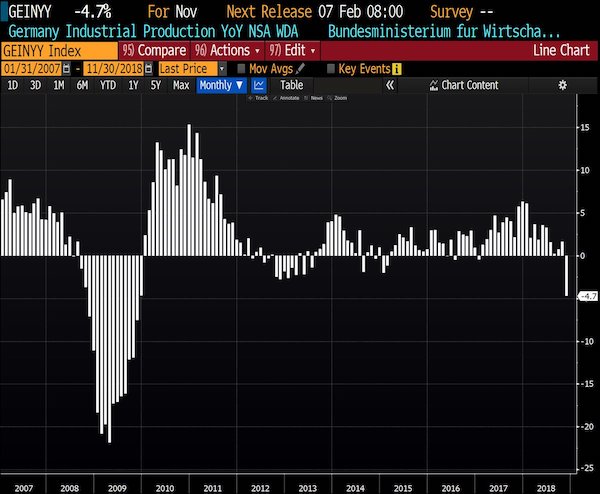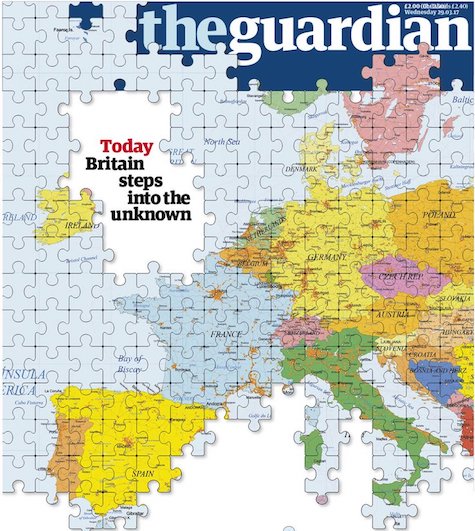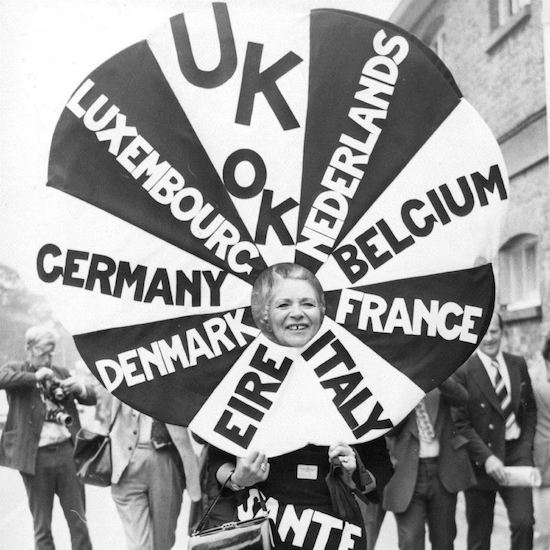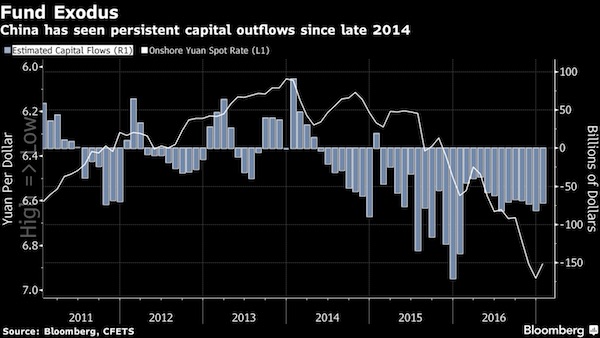
Pablo Picasso Bather on the beach 1920

Just what Europe needs: a recession in Germany.
• German Industrial Production Unexpectedly Slumps (WSJ)
German industrial production unexpectedly slumped in November, adding to recent evidence that a nine-year recovery in Europe’s largest economy is foundering. The data underscore how trade tensions and weaknesses in emerging markets are putting a brake on Germany’s longrunning economic upswing, and could delay any move by the ECB to lift short-term interest rates. Production in Germany’s key industrial sector, adjusted for inflation and seasonal swings, fell 1.9% in November from the previous month, the country’s statistics agency said Tuesday. Economists polled by The Wall Street Journal had expected a 0.3% gain. It was the second consecutive monthly fall in German industrial output and comes after data Monday showed an ongoing decline in new manufacturing orders.


Has been for years.
• China’s Current GDP Growth Likely Less Than 6% (CNBC)
China’s current economic growth is likely below the 6 percent level amid faltering domestic demand, an economist said Tuesday. Recent signals about the world’s second-largest economy point to weaker growth, including tech giant Apple recently lowering revenue guidance for the first quarter as it blamed a variety of factors including Chinese demand. And, on Monday, Hong Kong-listed automaker Geely said it missed its sales target in 2018 and was forecasting flat sales in 2019. “It’s intriguing that the domestic demand part is the weak part — the external demand is not that bad,” said Taimur Baig, chief economist at DBS Group Research.
“Particularly weak” domestic demand was possibly signaling structural changes in the Chinese economy, Baig told CNBC’s “Capital Connection.” For its part, DBS forecasts China’s GDP growth to be “sub-6 percent” currently, Baig said. Last year, China reported economic growth of 6.5 percent in the third quarter — marking its weakest pace since the global financial crisis. Still, the country’s official growth target for 2018 was around 6.5 percent.

Everyone has a phone who wants one.
• Samsung Warns Of 29% Profit Drop (BBC)
Samsung Electronics expects to post a 29% drop in quarterly operating profit as demand for smartphones and memory chips slows. The firm forecasts operating earnings of 10.8 trillion Korean won ($9.7bn; £7.6bn) for the last three months of 2018. It marks the first quarterly profit drop in two years as strong demand for chips had boosted earnings at the firm. Samsung also faces fierce competition from Apple and Chinese rivals. In a statement on Tuesday, the firm cited lacklustre demand and rising competition for its darkening outlook. “We expect earnings to remain subdued in the first quarter of 2019 due to difficult conditions for the memory business,” the South Korean tech giant said in a statement. It forecasts revenue will decline 11% to 59 trillion won.

But I betcha they’re talking about it.
• UK Not Looking To Extend Article 50, Brexit Minister Says (R.)
The United Kingdom will leave the European Union on March 29 and is not looking to extend the Article 50 exit process, Brexit Secretary Stephen Barclay said on Tuesday. The Daily Telegraph reported that British and European officials are discussing the possibility of extending Britain’s formal notice to withdraw from the EU amid fears a Brexit deal will not be approved by March 29. “The government’s policy is clear on this, the prime minister has said it on many an occasion: We are leaving the European Union on the 29th of March. We are not looking to extend,” Barclay told Sky News. When asked if any lawmakers in the Conservative Party had changed their minds on opposing May’s deal, Barclay said: “Some have said they are much more open to but it is obviously challenging.”

The lunatics have long ruled the asylum.
• UK MPs Raise Safety Fears With Police (G.)
Dozens of MPs have written to the UK’s most senior police officer to raise concerns about safety outside parliament after the Conservative MP Anna Soubry faced chants from protesters on Monday calling her a “Nazi”. At least 55 parliamentarians signed the letter to the Metropolitan police commissioner, Cressida Dick, after the Commons Speaker, John Bercow, urged officers to do more to protect MPs and Soubry criticised the lack of police response to the abuse. Scotland Yard later confirmed it had opened an investigation into whether any offences had been committed when chants of “Soubry is a Nazi” could clearly be heard while the pro-remain MP was being interviewed by BBC News on Abingdon Green, a grassed area outside parliament used by broadcasters.
It is the second time in recent weeks that Soubry has been targeted by a small group of pro-Brexit protesters wearing yellow vests, some of whom have links to the far right. On the earlier occasion, she was surrounded by shouting men calling her a traitor. The MPs’ letter to Dick reads: “After months of peaceful and calm protests by groups representing a range of political views on Brexit, an ugly element of individuals with strong far-right and extreme-right connections, which your officers are well aware of, have increasingly engaged in intimidatory and potentially criminal acts targeting members of parliament, journalists, activists and members of the public.

No doubt there.
• Yanis Varoufakis Says France’s Macron Is a ‘Spent Force’ (BBG)
Yanis Varoufakis, former Greek Finance Minister and founder of the Democracy in Europe Movement 2025, discusses political risks in Europe and his view that French President Emmanuel Macron is a “spent force.” He speaks on “Bloomberg Surveillance.”

Remember when stores employed half the town? You see much progress since then? First boxstores, then Amazon. Have they made people happier?
• A Farewell to “Bargain Shopping” (Kunstler)
What’s up is the international implosion of the bad debt, and the fading illusion that it doesn’t matter. It has any number of ways to express itself, from store closings, to dissolving pensions, to stock market instability, to divorce, homelessness, and war. It’s what you get from a hyper-financialized economy that doesn’t really produce wealth but only steals it from somewhere else. It’s not the fault of “capitalism,” which, in theory just stands for the management of a society’s savings. America doesn’t save, it borrows. Zero interest rates made savings a mug’s game, and zero interest rates were necessary to extend the borrowing far beyond the credible boundaries of repayment.
Debt isn’t capital, it just pretends to be for a period of time. Wall Street made its trillions off the time-value of that pretense and now time is up. Even in the hardship economy we’re sailing into, people will need to buy and sell things and it is very hard to see how that fundamental process of exchange might be reorganized going forward. Back in the 1990s I attended many a town meeting (in many towns) where chain stores applied for permits to set-up operations. It was often contentious. There was always a contingent of locals — organized by the chains themselves — waving placards that said “We Want Bargain Shopping.” And there were the short-sighted town officials drooling over the real estate tax “ratables” that chain stores represented.
Their adversaries feared that their locally-owned Main Street businesses would be killed, and that was exactly what happened, in very short order. You could see it coming from a thousand miles away. Now the Big Boxes are going down. Boo Hoo…. What will emerge out of the current disorder? Perhaps Generations X-Y-and-Z will recognize an opportunity to go into business — as an alternative to purchasing a degree in gender studies for $200,000 (at 6 percent interest). There will be lots of opportunities, even in a world with generally less shopping. But it may require a deeper collapse to sweep away the impediments, both practical and mental, before that awareness turns to action.

Trying to frustrate the withdrawal.
• Rival Fiefdoms Emerge In Scramble Over Trump’s Syria Withdrawal (AlM)
Even after Secretary of Defense Jim Mattis resigned over the decision, two of President Donald Trump’s top advisers have offered different messages about his intentions for a Syria withdrawal. Secretary of State Mike Pompeo has asserted, in both internal briefings and public interviews, that Trump’s instructions are clear and the troops are coming out, while saying the administration’s overall goals for the region have not changed. Meanwhile, national security adviser John Bolton, currently traveling in Israel and Turkey with a press pool in tow, has said any US withdrawal from Syria will be conditions-based, and won’t occur until the so-called Islamic State in Syria (IS or ISIS) is fully defeated and unless Turkey guarantees protection for Syrian Kurdish fighters that Ankara considers terrorists.
“There are objectives that we want to accomplish that condition the withdrawal,” Bolton told journalists traveling with him in Israel on Sunday. “The timing of the withdrawal occurs as a result of the fulfillment of the conditions and the establishment of the circumstances that we want to see. And once that’s done, then you talk about a timetable.” Pompeo offered a different emphasis in an internal briefing to State Department Syria watchers last week, sources said: We are leaving. Pompeo, in a Jan. 3 briefing to State Department personnel who work on Syria, “made clear we are leaving. Period,” a former US official, speaking not for attribution, told Al-Monitor. “He did not mention Iran. Or [Syrian President Bashar al-]Assad. He said we are leaving. That was it. Then he left.”

Trump better watch out that there isn’t an all-out bloody war between Turkey and the Kurds coming.
• Turkey To Ask US To Hand Over Military Bases In Syria (R.)
Turkey will ask U.S. officials in talks on Tuesday to hand over its military bases in Syria to Ankara or destroy them, the Hurriyet newspaper reported, a request that could further complicate discussions over the U.S. withdrawal from Syria. U.S. National Security Adviser John Bolton was meeting with his Turkish counterpart Ibrahim Kalin on Tuesday, days after Bolton added a condition to the U.S. withdrawal, saying Turkey must agree to protect the United States’ Kurdish ally, the YPG militia, which Ankara views as a terrorist group. President Donald Trump said last month he was bringing home the some U.S. 2,000 troops in Syria, saying they had succeeded in their mission to defeat Islamic State.
His abrupt move sparked concern among officials in Washington and allies abroad and prompted Defense Secretary Jim Mattis to resign. The YPG has been the key U.S. ally in its fight against Islamic State, support that has long caused tension between Washington and Ankara. Turkey views the YPG as an extension of the outlawed Kurdistan Workers Party (PKK), which has waged a three-decade insurgency in Turkey’s mainly Kurdish south east. “Give them or destroy them,” a Hurriyet newspaper headline said, referring to what it said were 22 U.S. military bases in Syria. It cited unspecified sources as saying Turkey would not accept Washington handing them over to the YPG.

Monsanto profits from the trade talks.
• China Approves Five GMO Crops For Import (R.)
China approved five genetically modified (GM) crops for import on Tuesday, the first in about 18 months in a move that could boost its overseas grains purchases and ease pressure from the United States to open its markets to more farm goods. The United States is the world’s biggest producer of GM crops, while China is the top importer of GM soybeans and canola. U.S. farmers and global seed companies have long complained about Beijing’s slow and unpredictable process for approving GM crops for import, stoking trade tensions between the world’s two largest economies. The approvals, announced on the agriculture ministry’s website, were granted while a U.S. trade delegation is meeting with its counterparts in the Chinese capital this week.
“It’s a goodwill gesture towards the resolution of the trade issue,” said a China representative of a U.S. agricultural industry association. “It’s been in the system for a long time but they chose today to release this good news,” he added, declining to be identified due to the sensitivity of the matter. Two of the newly approved products – BASF’s RF3 canola and Bayer-owned Monsanto’s glyphosate-tolerant MON 88302 canola – had been waiting six years for permission. The other approved products were DowDuPont’s DP4114 corn and DAS-44406-6 soybean, as well as the SYHT0H2 soybean developed by Bayer CropScience and Syngenta but now held by BASF.

Devastating.
• India’s Top Court Backs Monsanto On GMO Cotton Patents (R.)
India’s Supreme Court ruled on Tuesday that U.S. seed maker Monsanto can claim patents on its genetically modified (GM) cotton seeds in the world’s biggest producer of the fibre. The decision on appeal overturns an earlier ruling by the Delhi High Court that Monsanto – which has been bought by German drug and crop chemical maker Bayer AG – was unable to claim patents on GM cotton seeds. The outcome is positive for foreign agricultural companies such as Monsanto, Bayer, Dupont Pioneer and Syngenta which have been concerned that they could lose patents on GM crops in India.
“This is a very good move as most international companies have stopped releasing new technology in the Indian market due to the uncertainty over patent rule,” said Ajit Narde, a leader of the Shetkari Sanghatana, a farmers’ body, which has been demanding access to new technologies. Access to advanced technology was important to help Indian farmers to compete with rivals overseas, Narde said.

Trying to find a way out, so the IMF loan can come in.
• Ecuador To Audit Julian Assange’s Asylum & Citizenship (PBR)
Ecuador has begun a “Special Examination” of Julian Assange’s asylum and citizenship as it looks to the IMF for a bailout, the whistleblowing site reports, with conditions including handing over the WikiLeaks founder. Former Ecuadorian President Rafael Correa tweeted an image of the letter he received from the State Comptroller General on December 19, which outlines the upcoming examination by the Direction National de Auditoria. The audit will “determine whether the procedures for granting asylum and naturalization to Julian Assange were carried out in accordance with national and international law,” and will cover the period between January 1, 2012 and September 20, 2018. Assange has been in the Ecuadorian Embassy in London since he sought asylum there in 2012.
He was granted Ecuadorian citizenship last December in a bid to protect him from being extradited to the US where he fears he faces secret charges for publishing US government cables and documents. “Because of their hatred and persecution, we are the laughing stock of the world,” Correa said of the audit. WikiLeaks tweeted the news on Wednesday, joining the dots between the audit and Ecuador’s consideration of an International Monetary Fund bailout. The country owes China more than $6.5 billion in debt and falling oil prices have affected its repayment abilities. According to WikiLeaks, Ecuador is considering a $10 billion bailout which would allegedly come with conditions such as “the US government demanded handing over Assange and dropping environmental claims against Chevron,” for its role in polluting the Amazon rainforest.

Not sure such an extensive format is the way to go. The Guardian gets away with stonewalling its fake Assange news.
• WikiLeaks Tells Reporters 140 Things Not To Say About Julian Assange (R.)
WikiLeaks on Sunday advised journalists not to report 140 different “false and defamatory” statements about its founder Julian Assange, who has been holed up in the Ecuadorean embassy in London since June 2012. It was not immediately clear what prompted the advice to media organizations, but WikiLeaks singled out Britain’s Guardian newspaper for publishing what it said was a false report about Assange. The Guardian did not immediately respond late on Sunday to a Reuters request for comment. The Australian set up WikiLeaks as a channel for publishing confidential information from anonymous sources. He is a hero to some for exposing what supporters cast as government abuse of power and for championing free speech, but to others he is a rebel who has undermined the security of the United States.
WikiLeaks angered Washington by publishing hundreds of thousands of secret U.S. diplomatic cables that laid bare often highly critical U.S. appraisals of world leaders from Russian President Vladimir Putin to members of the Saudi royal family. “There is a pervasive climate of inaccurate claims about WikiLeaks and Julian Assange, including purposeful fabrications planted in large and otherwise ‘reputable’ media outlets,” Wikileaks said an email sent to media organizations and marked “Confidential legal communication. Not for publication.” “Consequently journalists and publishers have a clear responsibility to carefully fact-check from primary sources and to consult the following list to ensure they are not spreading, and have not spread, defamatory falsehoods about WikiLeaks or Julian Assange.”

Tyler has the entire list.
• 140 “False And Defamatory” Statements About Julian Assange (ZH)
WikiLeaks is sick and tired of mainstream media outlets publishing inaccurate and at times defamatory claims about its founder, Julian Assange. So in a recent email to journalists who regularly cover the organization, Wikileaks described 140 “false and defamatory” claims about its founder, who has been living inside the Ecuadorian embassy in London since June 2012. According to Reuters, WikiLeaks accused the Guardian of publishing a false report about Assange, though it was not immediately clear what specific report prompted the warning. The Guardian has refused to comment on the allegations.
The 5,000 word email claimed it was defamatory to suggest that Assange had ever been an “agent or officer of any intelligence service,” or that he had ever been employed by the Russian government, or that he is – or has been – closely connected with the Russian state. Some of the claims were more bizarre, like claiming that Assange was a pedophile, rapist, murder or a member of the Muslim Brotherhood. Others pertained to personal hygiene, like that Assange bleaches his hair, or has poor grooming habits. They also said it was defamatory to claim that Assange is a hacker or that he is not an Australian citizen.

How many people can understand this?
• Warming Of Oceans Equivalent To An Atomic Bomb Per Second For 150 Years (G.)
Global warming has heated the oceans by the equivalent of one atomic bomb explosion per second for the past 150 years, according to analysis of new research. More than 90% of the heat trapped by humanity’s greenhouse gas emissions has been absorbed by the seas, with just a few per cent heating the air, land and ice caps respectively. The vast amount of energy being added to the oceans drives sea-level rise and enables hurricanes and typhoons to become more intense. Much of the heat has been stored in the ocean depths but measurements here only began in recent decades and existing estimates of the total heat the oceans have absorbed stretch back only to about 1950. The new work extends that back to 1871. Scientists have said that understanding past changes in ocean heat was critical for predicting the future impact of climate change.
A Guardian calculation found the average heating across that 150-year period was equivalent to about 1.5 Hiroshima-size atomic bombs per second. But the heating has accelerated over that time as carbon emissions have risen, and was now the equivalent of between three and six atomic bombs per second. “I try not to make this type of calculation, simply because I find it worrisome,” said Prof Laure Zanna, at the University of Oxford, who led the new research. “We usually try to compare the heating to [human] energy use, to make it less scary.” She added: “But obviously, we are putting a lot of excess energy into the climate system and a lot of that ends up in the ocean,. There is no doubt.” The total heat taken up by the oceans over the past 150 years was about 1,000 times the annual energy use of the entire global population.












